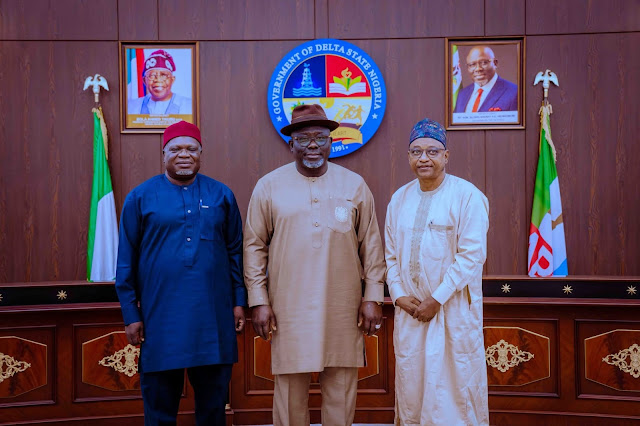In a significant development for Delta State’s educational and healthcare landscape, Governor Rt. Hon. Sheriff Oborevwori has reaffirmed his administration’s unwavering commitment to ensuring the successful establishment and operation of the Federal University of Medical and Health Sciences, Kwale. The pledge was made during a courtesy visit by the Governing Council and Management of the institution, led by its Chairman and Pro-Chancellor, Dr. Salisu Banye, to the Government House in Asaba on Tuesday. The governor’s assurances underscore his administration’s dedication to fostering quality education and improving healthcare delivery in the state, positioning the new university as a transformative project for both Delta State and Nigeria as a whole.
A Legacy Project for Education and Healthcare
Governor Oborevwori described the Federal University of Medical and Health Sciences as a legacy project with far-reaching implications for Delta State. He emphasized that the institution would not only expand access to quality education but also significantly enhance healthcare delivery by training competent medical professionals to meet the region’s growing needs. The governor’s remarks reflect a broader vision of transforming Delta State into a hub for academic excellence and healthcare innovation, aligning with his administration’s priorities of human capital development and socio-economic progress.
“As pioneers, you carry the heavy responsibility of putting this university on a solid footing,” Governor Oborevwori told the delegation. “The task ahead demands sacrifice, hard work, commitment, dedication, resourcefulness, and selflessness. I am impressed with the progress you have made so far, and I encourage you to sustain the momentum.” His words highlight the critical role of the university’s leadership in laying a strong foundation for the institution, while also acknowledging the strides already made since its establishment.
Comprehensive Support for the University’s Take-Off
Governor Oborevwori assured the Governing Council of his administration’s full support to ensure the university’s smooth take-off. This support includes the provision of critical infrastructure and logistical resources to facilitate the institution’s operations. Notably, the state government has already approved the use of the General Hospital in Kwale as the take-off site for the university’s Teaching Hospital. This strategic decision ensures that the university has immediate access to a functional healthcare facility, which is essential for its medical training programs.
In addition to the hospital, the governor disclosed that efforts are underway to extend electricity supply to the university’s campus, addressing one of the critical infrastructural requirements for academic and administrative activities. Reliable power supply is vital for creating a conducive environment for learning, research, and healthcare delivery, and the state’s commitment to this initiative demonstrates its proactive approach to supporting the university.
Governor Oborevwori also pledged to provide a 30-seater bus to the university, a gesture that will enhance mobility for students and staff, particularly during the institution’s early stages. This contribution reflects the governor’s attention to practical needs that can significantly impact the university’s day-to-day operations.
Addressing Historical Challenges in Higher Education
Reflecting on the broader context of higher education in Delta State, Governor Oborevwori recalled the challenges of limited admission slots that students faced in the past. During his tenure as Speaker of the Delta State House of Assembly, he played a pivotal role in addressing this issue by championing the establishment of additional state-owned universities. Today, Delta State boasts four thriving state universities, a feat unmatched by any other state in Nigeria. These institutions have significantly alleviated the pressure on university admissions, providing more opportunities for young Deltans to pursue higher education.
“With this new federal university, more opportunities will be created for our children,” the governor stated, highlighting the Federal University of Medical and Health Sciences as a continuation of his commitment to expanding access to education. The establishment of the university is expected to further reduce the admission bottlenecks that have historically limited opportunities for aspiring medical professionals in the region.
Delta State as an Education Hub
Governor Oborevwori also took the opportunity to celebrate Delta State’s growing reputation as a hub for educational excellence. He cited the recent success of public school students from Delta State who won a global debate competition in Doha, Qatar, as evidence of the state’s investment in quality education. This achievement underscores the effectiveness of the state’s educational policies and initiatives, which have prioritized both infrastructure and human capital development.
The governor’s pride in Delta’s educational accomplishments reflects his administration’s broader vision of positioning the state as a leader in academic and intellectual pursuits. The establishment of the Federal University of Medical and Health Sciences aligns with this vision, as it promises to further elevate Delta’s status as a center for learning and innovation.
The Pro-Chancellor’s Gratitude and Vision
In his remarks, Dr. Salisu Banye, the Pro-Chancellor and Chairman of the Governing Council, expressed profound gratitude to Governor Oborevwori for his steadfast support. He described the establishment of the Federal University of Medical and Health Sciences as a landmark achievement, not only for Delta State but for Nigeria as a whole. Dr. Banye commended the governor’s passion for infrastructure development, quality education, and healthcare, noting that his interventions have been critical to the university’s progress.
“Your interventions, including the provision of classrooms, laboratories, offices, and 200 hectares of land for the permanent site, reflect your passion for infrastructure, quality education, and healthcare,” Dr. Banye said. He emphasized that these contributions have laid a solid foundation for the university’s growth and development, positioning it to become a leading institution in medical education.
Dr. Banye also highlighted the university’s potential to transform healthcare delivery in Nigeria. By producing generations of competent medical professionals, the institution is expected to address critical gaps in the healthcare sector, particularly in underserved regions like Delta State. Furthermore, the university’s establishment is anticipated to drive socio-economic growth by creating jobs, fostering innovation, and attracting investment to the region.
Preparing for NUC Accreditation
The Pro-Chancellor disclosed that the Federal University of Medical and Health Sciences, established on March 6, 2023, is actively preparing for resource verification by the National Universities Commission (NUC). This verification process is a critical step toward obtaining accreditation, which will enable the university to commence academic programs and admit students into Medicine and Allied Health Sciences.
To meet the NUC’s stringent accreditation requirements, Dr. Banye appealed for additional government assistance. Specifically, he requested support for critical infrastructure projects, including access roads, drainage systems, perimeter fencing, student hostels, and a reliable power supply. These facilities are essential for creating a conducive academic environment and ensuring the university’s long-term sustainability.
Dr. Banye expressed confidence that with Governor Oborevwori’s continued support, the university would not only meet the NUC’s standards but also emerge as a center of excellence in medical education. He envisioned the institution becoming a national model for effective and innovative medical training, capable of competing with leading universities across the globe.
The Broader Implications of the University
The establishment of the Federal University of Medical and Health Sciences, Kwale, represents a significant milestone in Nigeria’s efforts to address the shortage of medical professionals and improve healthcare delivery. The country has long grappled with a critical deficit of doctors, nurses, and other healthcare workers, particularly in rural and underserved areas. By focusing on medical and health sciences, the university is well-positioned to produce graduates who will address these gaps, thereby improving access to quality healthcare for millions of Nigerians.
Moreover, the university’s location in Kwale, a relatively underserved area of Delta State, underscores its potential to drive regional development. The institution is expected to stimulate economic activity by creating jobs, attracting students and faculty from across the country, and fostering partnerships with healthcare providers and research organizations. The provision of 200 hectares of land for the permanent site further demonstrates the state’s long-term commitment to the university’s growth and sustainability.
The university’s focus on allied health sciences is particularly noteworthy, as it addresses the need for a diverse range of healthcare professionals, including pharmacists, physiotherapists, medical laboratory scientists, and radiographers. By training professionals in these fields, the university will contribute to a more holistic and robust healthcare system, capable of meeting the complex needs of Nigeria’s population.
Challenges and Opportunities Ahead
While the Federal University of Medical and Health Sciences holds immense promise, it also faces significant challenges, particularly in its formative years. Establishing a new university requires substantial financial and logistical resources, as well as careful planning to ensure academic and operational success. The NUC’s accreditation process, for instance, is rigorous and demands that the university meet high standards in terms of infrastructure, faculty, and curriculum.
Governor Oborevwori’s pledge of support is a critical factor in addressing these challenges. By providing infrastructure, logistical assistance, and political backing, the state government is helping to mitigate some of the financial and operational hurdles that the university may face. However, sustained investment and collaboration between the federal government, state government, and private sector will be essential to ensure the institution’s long-term success.
The university also presents numerous opportunities for Delta State and Nigeria. By training a new generation of medical professionals, the institution can help reduce Nigeria’s reliance on foreign-trained doctors and healthcare workers, thereby saving foreign exchange and promoting self-sufficiency. Additionally, the university’s research programs have the potential to drive innovation in medical science, contributing to advancements in healthcare delivery and public health policy.
A Model for Public-Private Collaboration
The establishment of the Federal University of Medical and Health Sciences also highlights the importance of collaboration between different levels of government and other stakeholders. The partnership between the federal government, which established the university, and the Delta State government, which is providing critical support, serves as a model for how public institutions can work together to achieve common goals.
Furthermore, there is significant potential for private sector involvement in the university’s development. Partnerships with healthcare companies, pharmaceutical firms, and international organizations could provide additional funding, expertise, and resources to enhance the university’s programs and facilities. Such collaborations could also create opportunities for internships, research grants, and job placements for students, further strengthening the university’s impact.
Governor Oborevwori’s Leadership and Vision
Governor Oborevwori’s commitment to the Federal University of Medical and Health Sciences reflects his broader vision for Delta State. Since assuming office, he has prioritized investments in education, healthcare, and infrastructure, recognizing their critical role in driving socio-economic development. His leadership in supporting the university demonstrates his ability to think strategically about the state’s future, balancing immediate needs with long-term goals.
The governor’s emphasis on education as a tool for empowerment is particularly evident in his administration’s efforts to expand access to higher education. By supporting the establishment of new universities and improving existing ones, Governor Oborevwori is creating opportunities for young Deltans to acquire the skills and knowledge needed to succeed in a rapidly changing world.
His focus on healthcare is equally significant. By facilitating the establishment of the university’s Teaching Hospital and ensuring access to critical infrastructure, the governor is laying the groundwork for a healthcare system that is more accessible, efficient, and responsive to the needs of Delta State’s residents.
Conclusion
The Federal University of Medical and Health Sciences, Kwale, represents a bold step forward in Delta State’s journey toward becoming a leader in education and healthcare. Governor Sheriff Oborevwori’s pledge of full support for the institution underscores his administration’s commitment to fostering human capital development and improving the quality of life for Deltans. Through strategic investments in infrastructure, logistics, and partnerships, the state government is helping to ensure the university’s successful take-off and long-term sustainability.
As the university prepares for its NUC accreditation and begins to admit students, it has the potential to transform not only Delta State but also Nigeria’s healthcare and education sectors. By producing competent medical professionals, driving research and innovation, and stimulating economic growth, the institution is poised to become a center of excellence and a source of pride for the state and the nation.
With Governor Oborevwori’s leadership and the dedication of the university’s Governing Council, the Federal University of Medical and Health Sciences is well on its way to achieving its ambitious goals. As it grows and evolves, the institution will undoubtedly play a pivotal role in shaping the future of healthcare and education in Nigeria, leaving a lasting legacy for generations to come.







